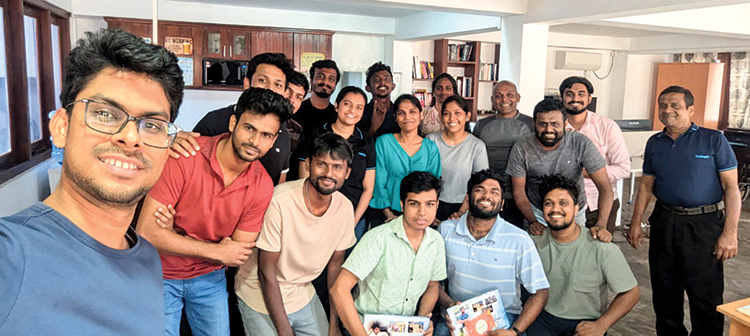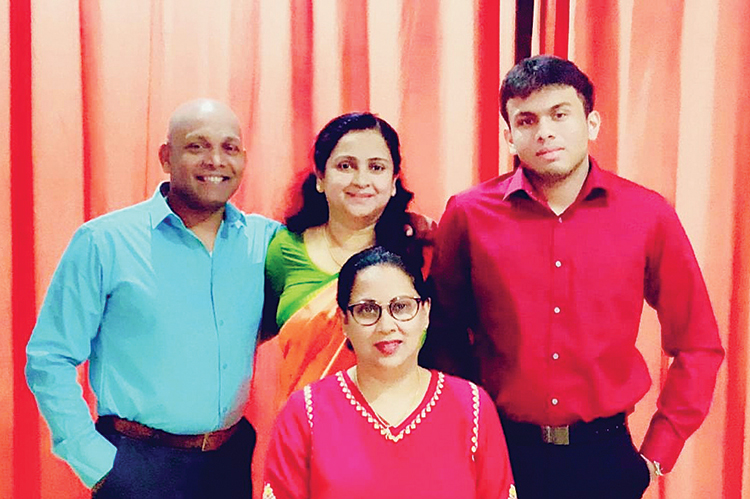Life style
Eating right and playing well

Optimum performance in competitive sports depends on multiple factors and ‘guided diets’ play a decisive role if sportsmen and women are to shine in the international sports arena says, Dr. Ranil Jayawardena, Senior Lecturer and Consultant Clinical Nutritionist from the Faculty of Medicine, University of Colombo and Visiting Fellow at the School of Exercise and Nutrition Sciences, Faculty of Health, Queensland University of Technology, Australia, in an interview with the Sunday Island.
by Randima Attygalle
While training is crucial in competitive sports, along with the sport culture of a particular nation, additional support both mentally and physically shape an international sports star. Added to this are sports psychology, injury prevention recovering support and proper nutrition. “Unlike when indulging in leisure sports, competitive sports demand sophisticated meal patterns and proper supplements for best results which include quick recovery, injury prevention, weight management and general health and wellbeing,” says Dr. Ranil Jayawardena.
In the absence of specialized ‘sports nutritionists’ here at home, many naturally rely on the advice of their ‘seniors’ or online material. “However, each individual requires a personalized dietary schedule depending on his/her socio-economic circumstances, training schedule, body weight, age, gender and the event calendar. For example what a gymnast requires is very different to what a marathon runner needs,” says the Specialist who goes onto add that there is no one diet or supplement for everyone. “One simply cannot generalize advice,” he reiterates.
Getting one’s hydration right is one of the easiest and cheapest nutritional strategies to optimize performance, yet Dr. Jayawardena says it is still one of the commonly overlooked factors by sportsmen. “Hydration is essential for both physical and mental faculties and this involves pre-hydration, during hydration and post-hydration.” Properly corrected Oral Rehydration Solutions such as Jeevani or fruit juices with salt and sugar are recommended here. “One doesn’t need expensive readymade isotonic formulas for proper hydration,” points out Dr. Jayawardena who explains further that sportsmen and women indulging in intense training must monitor their pre and post training body weight to estimate the water loss which needs to be corrected accordingly. “Your urine colour is an indicator of the hydration status. If it is dark, you are still dehydrated. One kilo of body weight loss after a training session represents a need for 1.5 ltr of fluid to be replaced.”
What is traditionally accepted as healthy food may not work for those doing intense sports, notes the Nutritionist. “The body derives energy from carbohydrates, hence choosing the correct carbs is vital for best performance. For instance a pre-training lunch of unpolished rice, high fat meats and fibre-rich vegetables such as dark green vegetables can go against an athlete. These meals reduce the rate of absorption of carbohydrates. Abdominal cramps while exercising are often the results of unabsorbed foods in the gut.”
If a training session exceeds one hour, intermediate carbohydrate-rich food is recommended and post training meal too should contain right carbs to enhance recovering, Dr. Jayawardena explains. “While a simple breakfast of bread, jam and banana is recommended for pre-training breakfast, a lunch of white rice, dhal, eggs/chicken/fish without leafy vegetables is recommended for lunch followed by a sweetened fruit juice, banana, a bun or crackers after training for recovery. While vegetables rich in fibre are discouraged for pre-training lunch since they take time to digest, they are recommended for dinner or four hours before a training session.”
Proteins, as the Specialist remarks, are the ‘building blocks for muscle growth and repair.’ A constant breakdown and regeneration of muscle tissue occurs every day which needs to be fuelled by the dietary intake of protein. Although protein requirement depends on body weight, gender, sport etc, an average sportsman needs 1.2-2.0g protein per kilogram of body weight. However, not all proteins are the same, warns the Nutritionist. “While some proteins are of high quality with all essential amino acids, others are not so.”
Protein intake should also be distributed throughout the day instead of being ‘loaded’ with it only at night. “While meats, poultry, fish, eggs are rich in proteins, pulses and nuts have a high level of carbohydrates and fat contrary to the common belief that they have a high concentration of proteins,” points out Dr. Jayawardena.
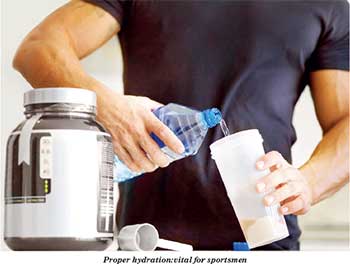 For competitive sportsmen and women, supplements are essential says the Nutritionist. These supplements however should be carefully selected on proper guidance either by a nutritionist or a sports physician, as some may contain banned substances for which they are tested nationally and internationally, he says. An overdose of them could also result in weight gain. “There are very safe Protein supplements including Whey protein, Casine protein, BCAA proteins, Amino acids capsules etc. If they select the correct product, they can be used to supplement and achieve daily protein requirements and help build muscle mass necessary for performance.” Reputed brands and reputed suppliers of the supplements are keys to safety, he adds.
For competitive sportsmen and women, supplements are essential says the Nutritionist. These supplements however should be carefully selected on proper guidance either by a nutritionist or a sports physician, as some may contain banned substances for which they are tested nationally and internationally, he says. An overdose of them could also result in weight gain. “There are very safe Protein supplements including Whey protein, Casine protein, BCAA proteins, Amino acids capsules etc. If they select the correct product, they can be used to supplement and achieve daily protein requirements and help build muscle mass necessary for performance.” Reputed brands and reputed suppliers of the supplements are keys to safety, he adds.
The supplements as Dr. Jayawardena explains, should be gradually introduced to a budding sportsman or woman, starting with very basic ones around the age of 16. “We don’t prescribe them at a very young age as this will impede their increase in performance at a more mature level. However, multi-vitamin mineral and iron supplements (latter especially for menstruating girls) are recommended depending on the individual requirement.” Vitamin D supplements are often recommended for those involved in indoor training (ex: squash, badminton, table tennis etc) to improve both bone and muscle health. “The urban Sri Lankan population is reported to be having Vitamin D deficiency as their exposure to the morning sunlight is minimum unlike the agrarian community of the country.”
He also warns of high doses of vitamin supplementations. “Very often we see them taking several multi-vitamins as well as high doses vitamins in isolation. Vitamin E is commonly abused since is no recognized deficiencies”
For vegetarians and vegans, pursuing an intense training sport could be a tough journey, observes Dr. Jayawardena. “Since their natural intake of proteins is very low, such people will have to rely on a very high intake of quality protein supplements. Maintaining body weight could also become challenging for vegetarians who tend to be partial to milk, curd, paneer and tofu rich in fat.”
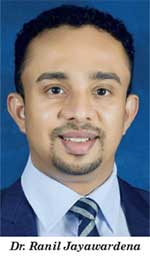 Fats from healthy sources such Omega 3 which is found in oily fish is highly recommended for those pursuing competitive sports. Moreover, Monounsaturated fatty acids are healthier compared to saturated fats. “Olive, avocado are also recommended provided there are no concerns about the body weight,” explains Dr. Jayawardena who urges to watch all fat types as they all contain a certain amount of calories.
Fats from healthy sources such Omega 3 which is found in oily fish is highly recommended for those pursuing competitive sports. Moreover, Monounsaturated fatty acids are healthier compared to saturated fats. “Olive, avocado are also recommended provided there are no concerns about the body weight,” explains Dr. Jayawardena who urges to watch all fat types as they all contain a certain amount of calories.
Understanding what and when to eat on a daily basis will have a huge impact on performance, mood, sleep, health and energy levels which should never be underestimated, says the specialist. Adding a variety of fruits and vegetables to the daily diet (at least two fruits and three vegetables per day) and two dairy products is essential.
Dr. Jayawardena, with his global exposure to sports nutrition, lobbies for both academic and professional intervention in this field locally. Voicing his concerns over the lack of ‘sports nutrition education’ in the country Dr. Jayawardena remarks: “it is still not part of our local medical curriculum. We only deliver it as a voluntary module which should not be the case,” Citing the Australian experience of a qualified sports nutrition education system complete with exercise physiologist, sports nutritionists and sports psychologists, he calls for intervention at national level at a time when the demand for such professionals is overwhelming to take the Sri Lankan sporting talent to the next level.
Life style
Salman Faiz leads with vision and legacy

Salman Faiz has turned his family legacy into a modern sensory empire. Educated in London, he returned to Sri Lanka with a global perspective and a refined vision, transforming the family legacy into a modern sensory powerhouse blending flavours,colours and fragrances to craft immersive sensory experiences from elegant fine fragrances to natural essential oils and offering brand offerings in Sri Lanka. Growing up in a world perfumed with possibility, Aromatic Laboratories (Pvt) Limited founded by his father he has immersed himself from an early age in the delicate alchemy of fragrances, flavours and essential oils.
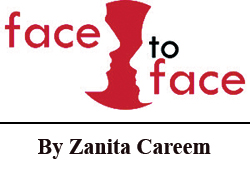 Salman Faiz did not step into Aromatic Laboratories Pvt Limited, he stepped into a world already alive with fragrance, precision and quiet ambition. Long before he became the Chairman of this large enterprise, founded by his father M. A. Faiz and uncle M.R. Mansoor his inheritance was being shaped in laboratories perfumed with possibility and in conversations that stretched from Colombo to outside the shores of Sri Lanka, where his father forged early international ties, with the world of fine fragrance.
Salman Faiz did not step into Aromatic Laboratories Pvt Limited, he stepped into a world already alive with fragrance, precision and quiet ambition. Long before he became the Chairman of this large enterprise, founded by his father M. A. Faiz and uncle M.R. Mansoor his inheritance was being shaped in laboratories perfumed with possibility and in conversations that stretched from Colombo to outside the shores of Sri Lanka, where his father forged early international ties, with the world of fine fragrance.
Growing up amidst raw materials sourced from the world’s most respected fragrance houses, Salman Faiz absorbed the discipline of formulation and the poetry of aroma almost by instinct. When Salman stepped into the role of Chairman, he expanded the company’s scope from a trusted supplier into a fully integrated sensory solution provider. The scope of operations included manufacturing of flavours, fragrances, food colours and ingredients, essential oils and bespoke formulations including cosmetic ingredients. They are also leading supplier of premium fragrances for the cosmetic,personal care and wellness sectors Soon the business boomed, and the company strengthened its international sourcing, introduced contemporary product lines and extended its footprint beyond Sri Lanka’s borders.
Today, Aromatic Laboratories stands as a rare example of a second generation. Sri Lankan enterprise that has retained its soul while embracing scale and sophistication. Under Salman Faiz’s leadership, the company continues to honour his father’s founding philosophy that every scent and flavour carries a memory, or story,and a human touch. He imbibed his father’s policy that success was measured not by profit alone but the care taken in creation, the relationships matured with suppliers and the trust earned by clients.
“We are one of the leading companies manufacturing fragrances, dealing with imports,exports in Sri Lanka. We customise fragrances to suit specific applications. We also source our raw materials from leading French company Roberte’t in Grasse
Following his father, for Salman even in moments of challenge, he insisted on grace over haste, quality over conveniences and long term vision over immediate reward under Salman Faiz’s stewardship the business has evolved from a trusted family enterprise into a modern sensory powerhouse.
Now the company exports globally to France, Germany, the UK, the UAE, the Maldives and collaborates with several international perfumes and introduces contemporary products that reflect both sophistication and tradition.
We are one of the leading companies. We are one of the leading companies manufacturing fine and industrial fragrance in Sri Lanka. We customise fragrances to suit specific applications said Faiz
‘We also source our raw materials from renowned companies, in Germany, France, Dubai,Germany and many others.Our connection with Robertet, a leading French parfume House in Grasse, France runs deep, my father has been working closely with the iconic French company for years, laying the foundation for the partnership, We continue even today says Faiz”
Today this business stands as a rare example of second generation Sri Lankan entrepreneurship that retains its souls while embracing scale and modernity. Every aroma, every colour and every flavour is imbued with the care, discipline, and vision passed down from father to son – a living legacy perfected under Salmon Faiz’s guidance.
By Zanita Careem
Life style
Home coming with a vision
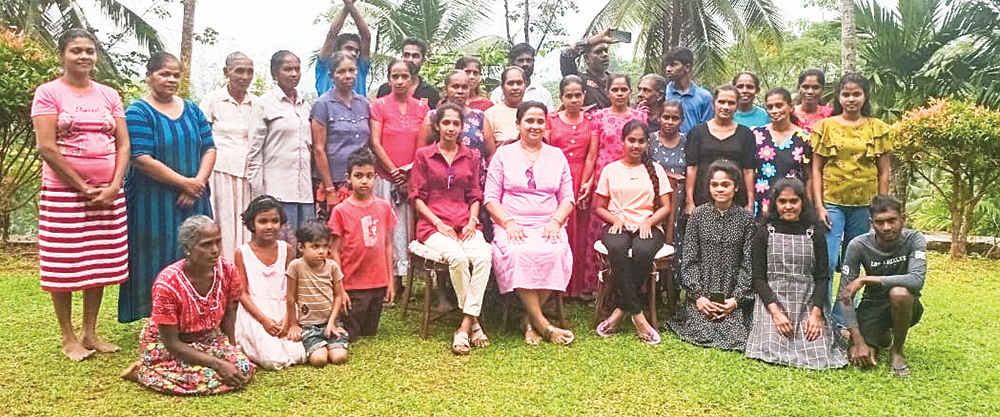
Harini and Chanaka cultivating change
When Harini and Chanaka Mallikarachchi returned to Sri Lanka after more than ten years in the United States, it wasn’t nostalgia alone that they brought home . It was purpose.Beneath the polished resumes and strong computer science backgrounds lay something far more personal- longing to reconnect with the land, and to give back to the country that shaped their memories. From that quiet but powerful decision was born Agri Vision not just an agricultural venture but a community driven movement grounded in sustainability ,empowerment and heritage. They transform agriculture through a software product developed by Avya Technologies (Pvt Limited) Combining global expertise with a deep love for their homeland, they created a pioneering platform that empowers local farmers and introduce innovative, sustainable solutions to the country’s agri sector.
After living for many years building lives and careers in theUnited States, Harini and Chanaka felt a powerful pull back to their roots. With impressive careers in the computer and IT sector, gaining global experience and expertise yet, despite their success abroad, their hearts remained tied to Sri Lanka – connection that inspired their return where they now channel their technological know-how to advance local agriculture.
For Harini and Chanaka, the visionaries behind Agri Vision are redefining sustainable agriculture in Sri Lanka. With a passion for innovation and community impact, they have built Agri Vision into a hub for advanced agri solutions, blending global expertise with local insight.
In Sri Lanka’s evolving agricultural landscape, where sustainability and authenticity are no longer optional but essential. Harini and Chanaka are shaping a vision that is both rooted and forward looking. In the heart of Lanka’s countryside, Uruwela estate Harini and Chanaka alongside the ever inspiring sister Malathi, the trio drives Agri Vision an initiative that fuses cutting edge technology with age old agricultural wisdom. At the core of their agri philosophy lies two carefully nurtured brands artisan tea and pure cinnamon, each reflecting a commitment to quality, heritage and people.
Armed with global exposure and professional backgrounds in the technology sector,they chose to channel thier experiences into agriculture, believing that true progress begins at home.
- Avya Technologies (Pvt) ltd software company that developed Agri Vision
- Chanaka,Harini and Shakya Mallikarachchi and Malathi Malathi dias (middle)
But the story of Agri Vision is as much about relationships as it is about technology. Harini with her sharp analytical mind, ensures the operations runs seamlessly Chanaka, the strategist looks outward, connecting Agri Vision to globally best practices and Malathi is their wind behind the wings, ensures every project maintains a personal community focussed ethos. They cultivate hope, opportunity and a blueprint for a future where agriculture serves both the land and the people who depend on it .
For the trio, agriculture is not merely about cultivation, it is about connection. It is about understanding the rhythm of the land, respecting generations of farming knowledge, and that growth is shared by the communities that sustain it. This belief forms the backbone of Agro’s vision, one that places communities not only on the periphery, but at the very heart of every endeavour.
Artisan tea is a celebration of craft and origin sourced from selected growing regions and produced with meticulous attention to detail, the tea embodier purity, traceability and refinement, each leaf is carefully handled to preserve character and flavour, reflecting Sri Lanka’s enduring legacy as a world class tea origin while appealing to a new generation of conscious consumers complementing this is pure Cinnamon, a tribute to authentic Ceylon, Cinnamon. In a market saturated with substitutes, Agri vision’s commitment to genuine sourcing and ethical processing stands firm.
By working closely with cinnamon growers and adhering to traditional harvesting methods, the brands safeguards both quality and cultural heritage.
What truly distinguishes Harini and Chanake’s Agri Vision is their community approach. By building long term partnerships with smallholders. Farmers, the company ensures fair practises, skill development and sustainable livelihoods, These relationships foster trust and resilience, creating an ecosystem where farmers are valued stakeholders in the journey, not just suppliers.
Agri vision integrates sustainable practices and global quality standards without compromising authenticity. This harmony allows Artisan Tea and Pure Cinnamon to resonate beyond borders, carrying with them stories of land, people and purpose.
As the brands continue to grow Harini and Chanaka remain anchored in their founding belief that success of agriculture is by the strength of the communities nurtured along the way. In every leaf of tea and every quill of cinnamon lies a simple yet powerful vision – Agriculture with communities at heart.
By Zanita Careem
Life style
Marriot new GM Suranga
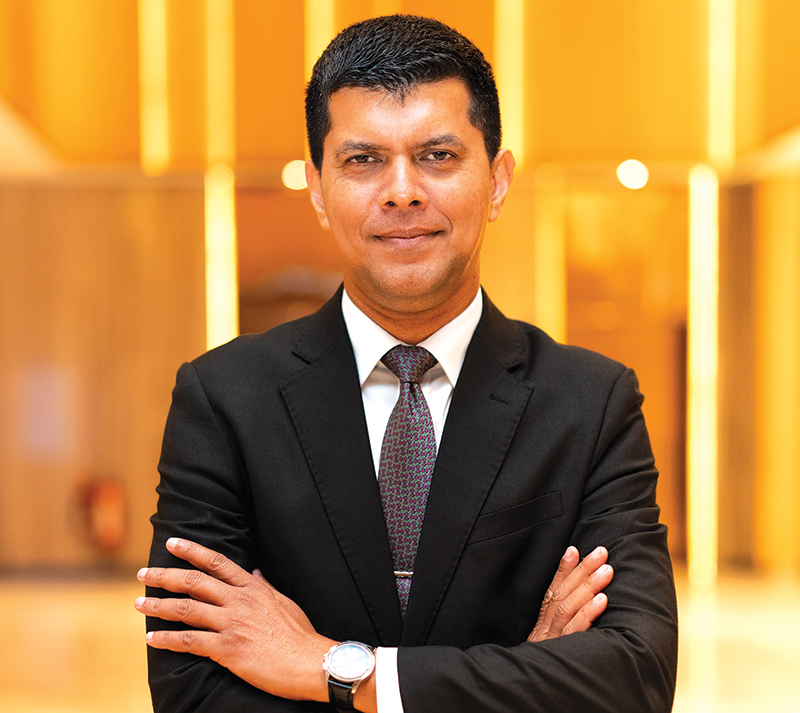
Courtyard by Marriott Colombo has welcomed Suranga Peelikumbura as its new General Manager, ushering in a chapter defined by vision, warmth, and global sophistication.
Suranga’s story is one of both breadth and depth. Over two decades, he has carried the Marriott spirit across continents, from the shimmering luxury of The Ritz-Carlton in Doha to the refined hospitality of Ireland, and most recently to the helm of Resplendent Ceylon as Vice President of Operations. His journey reflects not only international mastery but also a devotion to Sri Lanka’s own hospitality narrative.
What distinguishes Suranga is not simply his credentials but the philosophy that guides him. “Relationships come first, whether with our associates, guests, partners, or vendors. Business may follow, but it is the strength of these connections that defines us.” It is this belief, rooted in both global perspective and local heart, that now shapes his leadership at Courtyard Colombo.
At a recent gathering of corporate leaders, travel partners, and media friends, Suranga paid tribute to outgoing General Manager Elton Hurtis, hon oring his vision and the opportunities he created for associates to flourish across the Marriott world. With deep respect for that legacy, Suranga now steps forward to elevate guest experiences, strengthen community ties, and continue the tradition of excellence that defines Courtyard Colombo.
From his beginnings at The Lanka Oberoi and Cinnamon Grand Colombo to his leadership roles at Weligama Bay Marriott and Resplendent Ceylon, Suranga’s career is a testament to both resilience and refinement. His return to Marriott is not merely a professional milestone, it is a homecoming.
-

 Life style2 days ago
Life style2 days agoMarriot new GM Suranga
-

 Features2 days ago
Features2 days agoMonks’ march, in America and Sri Lanka
-

 Midweek Review6 days ago
Midweek Review6 days agoA question of national pride
-

 Business6 days ago
Business6 days agoAutodoc 360 relocates to reinforce commitment to premium auto care
-

 Opinion5 days ago
Opinion5 days agoWill computers ever be intelligent?
-

 Features2 days ago
Features2 days agoThe Rise of Takaichi
-

 Business16 hours ago
Business16 hours agoMinistry of Brands to launch Sri Lanka’s first off-price retail destination
-

 Features2 days ago
Features2 days agoWetlands of Sri Lanka:




